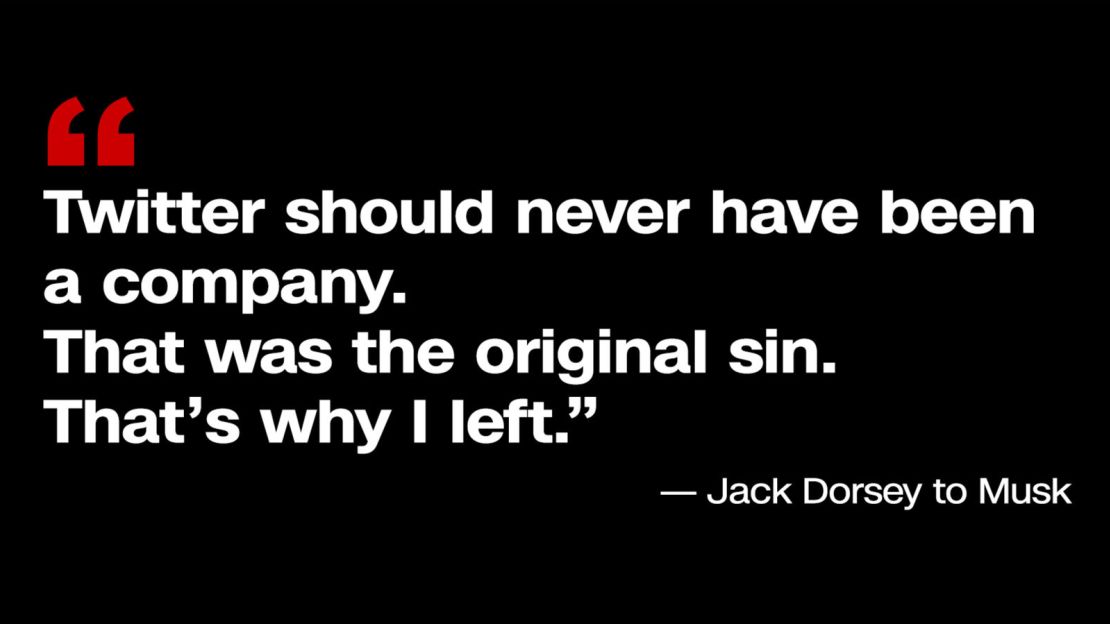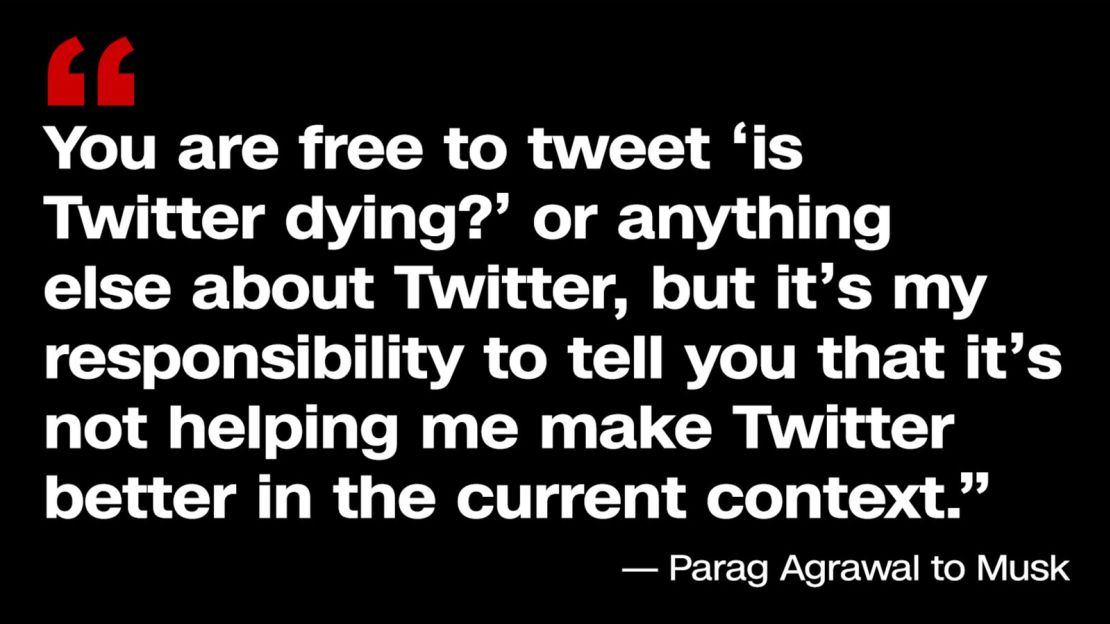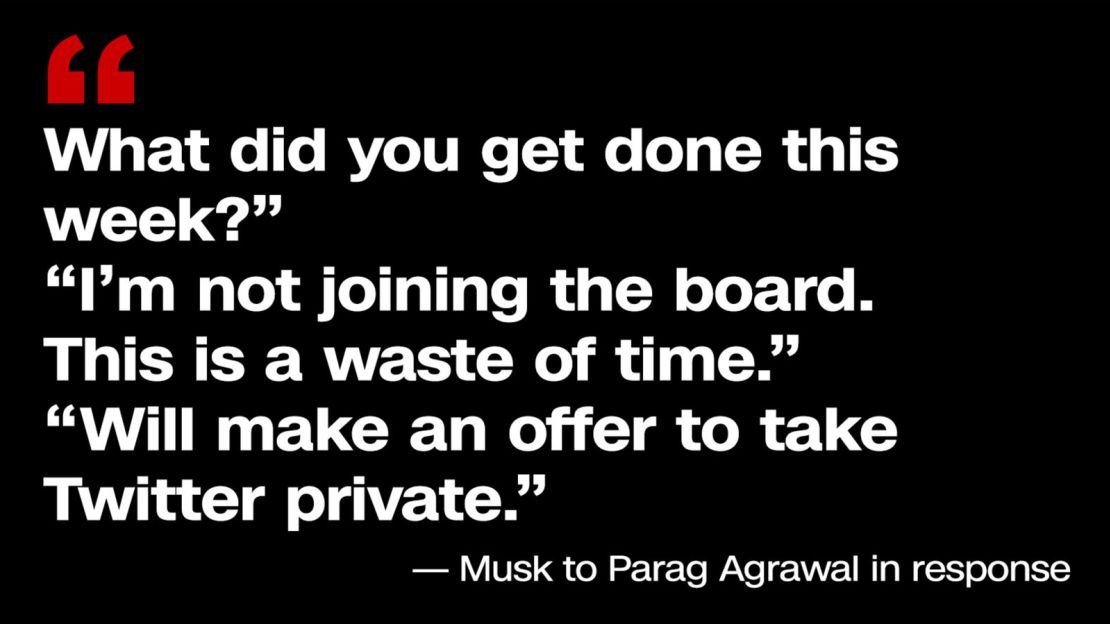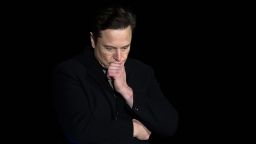Days before publicly announcing his investmentin Twitter, Elon Musk texted with Jack Dorsey. The former Twitter CEO suggested he no longer believed in the company he founded, according to new court filings in the legal battle between Musk and Twitter.
Musk had begun quietly building up a large stake in Twitter (TWTR) in January. In a text on March 26, Dorsey told Musk, “a new platform is needed. It can’t be a company. This is why I left.”
Musk, an avid Twitter user who was often seen as friendly with Dorsey, responded by asking what the platform should look like. Dorsey explained his view that it should be “an open source protocol” and not rely on “an advertising model,” as Twitter currently does. Dorsey added that Twitter “should never have been a company,” saying, “that was the original sin.”
Musk expressed interest in advancing the idea. In a later text that day, he said: “I think it’s worth both trying to move Twitter in a better direction and doing something new that’s decentralized.”

The private exchanges between Dorsey and Musk are among the many text messages released in court filings this week, offering new insight into the Tesla CEO’s agreement to buy Twitter for $44 billion and his attempt later to back away from the deal. The messages also offer a unique window into Silicon Valley deal-making, as a rotating cast of billionaires and industry execs — from Larry Ellison and Marc Benioff to members of the Murdoch family — slide into Musk’s text messages to discuss Twitter and, in some cases, casually offer financial backing for the deal.
In the days following his private chat with Dorsey, Musk met with Twitter’s board and leadership. On April 5, Musk agreed to join the company’s board, a move that Dorsey championed publicly and privately. In a text exchange with Musk later that day, Dorsey expressed confidence in Parag Agrawal, his successor as Twitter’s CEO. Agrawal also expressed excitement in private texts about Musk joining the board.
But the relationship between Musk and the Twitter CEO appeared to sour quickly.
On April 9, Musk tweeted a question: “Is Twitter dying?” Agrawal followed up that day with a text letting Musk know such comments would make the CEO’s life difficult.

“You are free to tweet ‘is Twitter dying?’ or anything else about Twitter,” Agrawal said in the text to Musk, “but it’s my responsibility to tell you that it’s not helping me make Twitter better in the current context. Next time we speak, I’d like you to provide [your] perspective on the level of internal distraction right now and how [it’s] hurting our ability to do work … I’d like the company to get to a place where we are more resilient and don’t get distracted, but we aren’t there right now.”
Musk responded tersely: “What did you get done this week?” In two follow-up texts, he rescinded his agreement to join the board, saying, “I’m not joining the board. This is a waste of time.” He added: “Will make an offer to take Twitter private.”
In a separate exchange on the same day with Twitter’s board chair Bret Taylor, Musk said: “Fixing Twitter by chatting with Parag won’t work,” Musk said. He added in a follow up text: “Drastic action is needed.”

Musk and Twitter announced an acquisition agreement on April 25. A little more than two months later, Musk said he wanted out of the deal, citing concerns about the number of bot and spam accounts on the platform. Twitter then sued Musk to compel him to follow through with the deal.
The two sides are set to go to trial over the deal next month.
Making the deal – and a vision for Twitter’s future
After Musk’s initial investment in Twitter was made public, and with speculation mounting about a possible takeover deal, the billionaire began to receive input from some prominent outside voices.
In a text on April 23, two days before the deal was announced, the controversial podcast host Joe Rogan said to Elon Musk: “I REALLY hope you get Twitter. If you do, we should throw one hell of a party.”
Musk also messaged with bankers and potential investors such as his brother, Kimbal Musk, and Ellison, the billionaire founder of Oracle, in an effort to line up financing for the deal, as well as potential leaders for the new company if his acquisition bid succeeded. Musk and investor JasonCalacanis discussed the latter becoming a strategic advisor or board member. Someone identified in Musk’s texts as “BL Lee” suggested venture capitalist Bill Gurley as Twitter’s new CEO.
In the daysafter the acquisition deal was announced, Musk discussed ideas for the platform with a host of characters, including LinkedIn co-founder Reid Hoffman, Microsoft CEO Satya Nadella and tech investor David Sacks. Sacks suggested that former Michigan congressman Justin Amash should be involved in Twitter’s content moderation efforts.
Musk’s banker Michael Grimes suggested crypto billionaire wunderkind Sam Bankman-Fried as an investor who could also help advance Musk’s vision of a Twitter built on the blockchain, the technology underpinning cryptocurrencies.
The new filing also includes a text from Musk to Grimes that was referenced in a hearing earlier this month by Twitter lawyers, who claim that Musk exited the deal not because of his worries about bots but because he was concerned about the stock market decline and geopolitical issues, neither of which would be legitimate reasons to terminate the agreement.
In a May 8 message to Grimes, Musk said that the deal process should “slow down just a few days” ahead of a speech by Russian President Vladimir Putin the following day that many worried could escalate the war in Ukraine to other countries. “It won’t make sense to buy Twitter if we’re headed into WW3,” Musk said.







